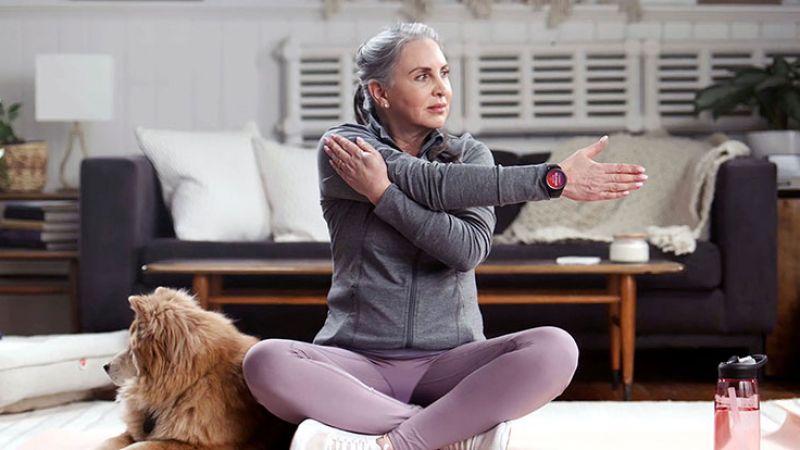In this blog you will learn quick and easy ways to improve or maintain your balance, the reasons why you may feel off balance, fall prevention tips and a way to get immediate help if you fall.
Have you reached for something on a high shelf, looked up, and felt a bit of a wobble? You’re not alone. About one in five people over the age of 74 experience problems with dizziness or balance, according to a National Library of Medicine study. (And there are plenty of people under the age of 74 struggling with it, too!)
Age can certainly play a factor in balance issues since body systems that regulate balance age right along with the rest of us. But certain medications, medical conditions, such as inner ear issues, may also affect your balance.
Test your balanceIf you’re curious and want to check your balance, try this while holding on to something sturdy: Lift one foot and see how long you can hold it there. Then try the other foot.
To test your moving balance, try resting your hand on a wall and walking as if you’re on a tight rope, heel to toe. If you find either one difficult, you may need to work on your balance or your strength. (Always consult a medical professional for a true diagnosis.)
Ways to improve balanceIf you have balance issues, there’s good news: You’re most likely already doing activities that help stabilize balance. Walking, biking, and climbing stairs are all balance-strengthening activities. But if you want a more intentional workout, according to Harvard Health, your local YMCA or senior center may offer classes, or you can try the suggestions below:
-Stretching helps loosen tight muscles, which can affect posture and balance
-Yoga strengthens and stretches tight muscles while challenging your balance skills
-Tai chi helps improve balance by slowly shifts your weight from foot to foot, rotating your truck, and extending limbs
-Using a treadmill, recumbent bike or stair stepper machine work to strengthen your lower body.
For quick, daily balance-strengthening at home, WebMD offers a series of do-anywhere exercises that use your body weight to improve your balance:
-One-legged stand: While holding on to the back of a chair with both hands for stability, lift one foot, bending at the knee, to about calf level and hold for 10 seconds. Repeat about 10 times each leg.
-Leaning foot to foot: Stand with your feet hip-width apart and lean slowly onto one leg until that leg is bearing your weight. When you feel steady, lift the other leg about an inch off the floor. Hold for 30 seconds and then place your foot down. Repeat on the other side.
–Slide Steps: Slide one foot sideways to move your legs apart and then slide your other foot over to meet the first foot. Then slide step across the room and back to work out both sides.
How to Prevent FallsDoing all you can to prevent falls in the first place is another important step. The National Council on Aging offers the following suggestions to reduce falls:
-Get an eye exam to ensure your prescription is correct.
-Seek physical therapy if your gate or balance is off.
-Review medication side effects to learn if the medications make you dizzy.
-Perform a safety check in your home, for example check for secure stair rails and bathroom grab bars.
Purchase protection, use preventionWhile prevention is the best medicine, you just never know when a fall can occur. Thousands of people have bought medical alert devices (also known as safety alert devices) just in case they are needed. According to the Center for Disease Control and prevention, every second of every day, an older adult suffers a fall.
If this happens to you, reaching someone immediately is important. Having fall alert systems within reach, either on-the-go or at home, ensures you can receive help from a press of a button.
Modern medical alertsMedical alerts aren’t like they used to be. As adults stay active as they age, they have different needs. Modern day medical alerts come in all shapes and sizes, and they offer much more than just a button to press.
You can wear them as a pretty pendant around your neck, a bracelet around your wrist, or clip-on for your belt or purse. Some devices even include a fall detector for elderly loved ones.
Medical Guardian even offers a medical alert smartwatch that tracks your steps, calculates calories burned, and sends you messages and calendar reminders. You can even talk to the watch to send to a loved one. That is certainly a modern twist on traditional medical alert technology.
For more information on Medical Guardian products, please call 800-668-9200.
ABOUT THE AUTHOR: Medical Guardian is a leading provider of innovative medical alert systems that empower people to live a life without limits.

